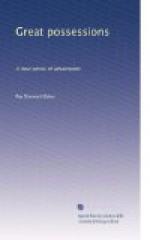Now this birthday gathering has one historic ceremony which none of us would miss, because it expresses so completely the essence of our friend’s generous and tolerant, but just, nature. He is, as I have said, a temperate man, and dislikes as much as any one I know the whole alcohol business; but living in a community where the struggle for temperance has often been waged intemperately, and where there is a lurking belief that cudgelling laws can make men virtuous, he publishes abroad once a year his declaration of independence.
After we have been with our friend for an hour or so, and are well warmed and happy with the occasion, he rises solemnly and goes to the toby-closet at the end of his generous fireplace, where the apple-log specially cut for the occasion is burning merrily, and as we all fall silent, knowing well what is coming, he unlocks the door and takes from the shelf a bottle of old peach brandy which, having uncorked, he gravely smells of and possibly lets his nearest neighbour smell of too. Then he brings from the sideboard a server set with diminutive glasses that have been polished until they shine for the great occasion, and, having filled them all with the ripe liquor, he passes them around to each of us. We have all risen and are becomingly solemn as he now proposes the toast of the year—and it is always the same toast:
“Here’s to moderation—in all things!”
He takes a sip or two, and continues:
“Here’s to temperance—the queen of the virtues.”
So we all drink off our glasses. Our mellow old friend smacks his lips, corks the tall bottle, and returns it to his toby-closet, where it reposes undisturbed for another year.
“And now, gentlemen,” he says, heartily, “let us go in to dinner."...
As I think of it, now that it is written, this story bears no very close relationship to my original subject, and yet it seemed to follow naturally enough as I set it down, and to belong with the simple and well-flavoured things of the garden and fields; and recalling the advice of Cobbett to his nephew on the art of writing, “never to alter a thought, for that which has come of itself into your mind is likely to pass into that of another more readily and with more effect than anything which you can by reflection invent,” I leave it here just as I wrote it, hoping that the kinship of my genial old friend with simple and natural and temperate things may plainly appear.
CHAPTER V
PLACES OF RETIREMENT
“Good God, how sweet are all things here!
How beautiful the fields appear!
How cleanly do we feed and lie!
Lord, what good hours do we keep!
How quietly we sleep!”
Charles Cotton (a friend of Izaak Walton)
April 29th.




